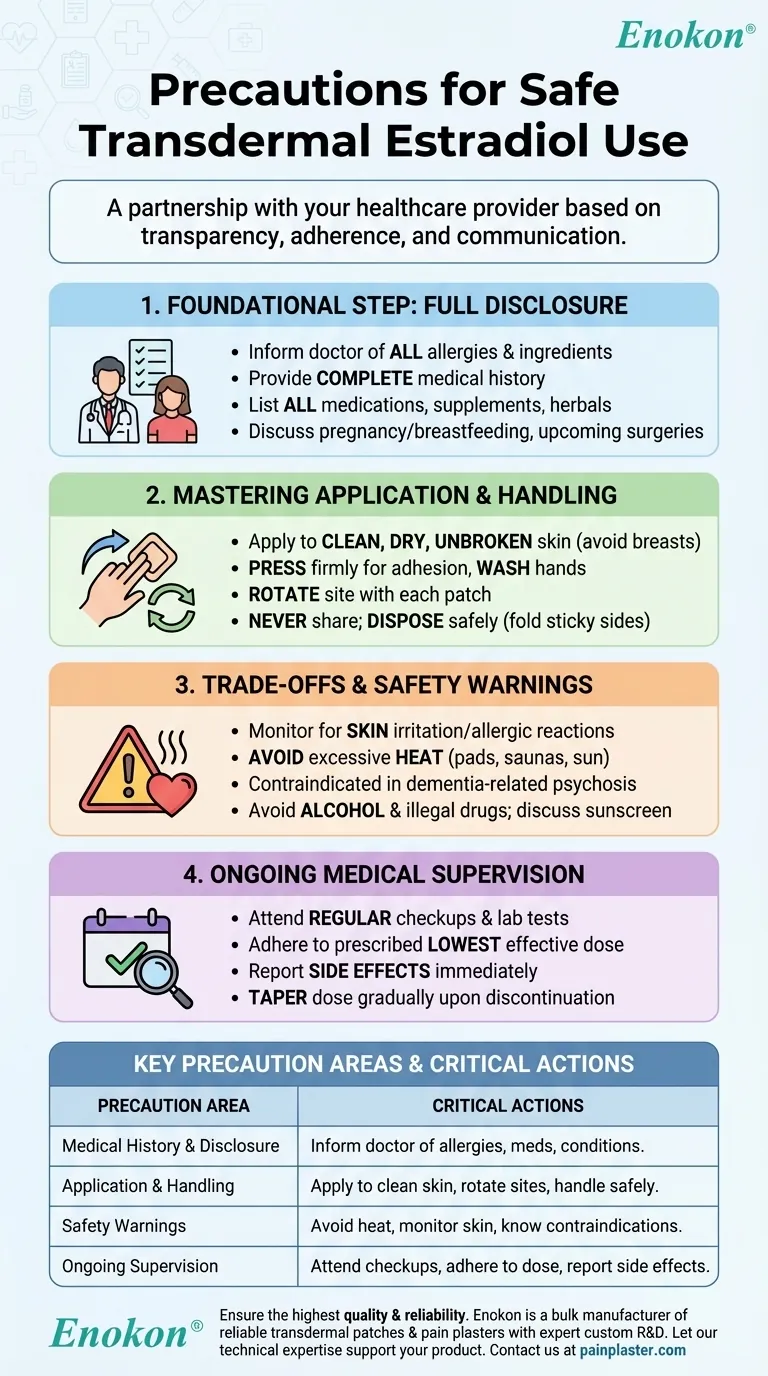Before using transdermal estradiol, the most critical precautions are to have a comprehensive discussion with your doctor about your complete medical history and to disclose every medication, supplement, or herbal product you use. This ensures the treatment is appropriate for you and helps prevent dangerous interactions. Proper application, diligent monitoring, and understanding key safety warnings are also essential for safe and effective use.
Safe and effective use of transdermal estradiol is an active partnership between you and your healthcare provider. It hinges on your initial transparency, consistent adherence to instructions, and ongoing communication about your body's response to the medication.

The Foundational Step: Full Disclosure with Your Doctor
Effective treatment begins long before you apply the first patch. It starts with an open and thorough conversation with your physician.
Disclosing Your Medical History and Allergies
You must inform your doctor of any known allergies, especially to estrogens, adhesives, or other ingredients that may be in the patch.
Provide a complete medical history. Certain conditions may make this medication inappropriate, and it is crucial your doctor has a full picture of your health.
Listing All Medications and Supplements
Create a comprehensive list of everything you take. This includes all prescription and nonprescription medications, vitamins, nutritional supplements, and herbal products.
Even seemingly harmless supplements can interact with hormone therapy, so no detail is too small.
Discussing Lifestyle and Future Procedures
Inform your doctor if you are pregnant, planning to become pregnant, or breastfeeding, as estradiol patches should not be used in these situations.
Mention any upcoming surgeries, including dental procedures or an MRI, as the patch may need to be removed.
Mastering Application and Handling for Efficacy
How you apply, handle, and dispose of the patch directly impacts its effectiveness and the safety of those around you.
The Correct Application Process
Always apply the patch to a clean, dry, and unbroken area of skin. Avoid applying it to your breasts or to oily, damaged, or irritated skin.
Press the patch firmly in place to ensure it adheres well, and always wash your hands after handling it.
The Importance of Site Rotation
To prevent skin irritation, you must rotate the application site with each new patch. Following a rotation schedule helps ensure your skin remains healthy.
Safe Handling and Disposal
This medication is for your use only; never share it.
Keep new and used patches far out of reach of children and pets. A used patch still contains active medication that can be harmful. Dispose of it by folding it in half with the sticky sides together.
Understanding the Trade-offs and Key Safety Warnings
While effective, transdermal estradiol carries risks that require vigilance. Being aware of potential issues is a key part of using the medication safely.
Skin Irritation and Allergic Reactions
Pay close attention to the application site. Watch for signs of a serious allergic reaction or significant skin irritation and report them to your doctor immediately.
The Risk of Heat Exposure
Do not expose the patch to excessive heat. This includes avoiding heating pads over the patch area and being mindful of saunas or long periods in direct, intense sun.
Heat can increase the rate at which the hormone is absorbed into your body, potentially leading to an overdose.
Specific Medical Contraindications
This medication carries specific warnings. For example, it should not be used by individuals with dementia-related psychosis due to an increased risk of death.
Interactions with Other Substances
Avoid using alcohol or illegal drugs while wearing the patch. You should also discuss the use of sunscreen with your doctor, as it may affect how the medication is absorbed through your skin.
The Importance of Ongoing Medical Supervision
Transdermal estradiol therapy is not a "set it and forget it" treatment. It requires active, long-term monitoring.
Regular Checkups and Lab Tests
You will need regular medical checkups, which may include pelvic exams and lab tests, to monitor your body's response to the hormone.
It is critical that you attend all scheduled appointments with your healthcare provider.
Adhering to Prescribed Dosage
Always use the lowest effective dose for the shortest duration necessary to achieve your treatment goals. Never change your dose or stop the medication without consulting your doctor.
When discontinuing use, your doctor will likely advise you to taper the dosage gradually.
Reporting Side Effects Promptly
If you experience any unusual problems or side effects while using this medication, call your doctor immediately. Prompt communication is key to managing your health safely.
A Practical Checklist for Safe Estradiol Patch Use
Your approach to using transdermal estradiol should be guided by your specific goals and circumstances.
- If you are just starting therapy: Your primary focus is providing a complete and honest medical history to your doctor and mastering the correct application technique.
- If you are an ongoing user: Your priority is to remain diligent about rotating application sites and attending all of your scheduled follow-up appointments for monitoring.
- If you are concerned about side effects: Your most important action is to keep a simple log of any new symptoms and report them to your doctor immediately, never attempting to adjust your dose on your own.
By taking these precautions seriously, you empower yourself to use transdermal estradiol safely and effectively as a key part of your health management.
Summary Table:
| Key Precaution Area | Critical Actions to Take |
|---|---|
| Medical History & Disclosure | Inform doctor of all allergies, medications, and medical conditions. |
| Application & Handling | Apply to clean, dry skin; rotate sites; handle and dispose safely. |
| Safety Warnings | Avoid heat exposure; monitor for skin reactions; know contraindications. |
| Ongoing Supervision | Attend regular checkups; adhere to prescribed dose; report side effects promptly. |
Ensure the highest quality and reliability for your transdermal products. As Enokon, a bulk manufacturer of reliable transdermal patches and pain plasters for healthcare and pharma distributors and brands, we provide expert custom R&D and development to meet your specific needs. Let our technical expertise support your product safety and efficacy. Contact us today to discuss your requirements!
Visual Guide

Related Products
- Far Infrared Heat Pain Relief Patches Transdermal Patches
- Capsaicin Chili Medicated Pain Relief Patches
- Icy Hot Menthol Medicine Pain Relief Patch
- Menthol Gel Pain Relief Patch
- Heating Pain Relief Patches for Menstrual Cramps
People Also Ask
- How do Deep Heat Pain Relief Patches provide pain relief? Discover the Drug-Free Mechanism
- How does capsaicin work in the medicated heat patch? The Science Behind Pain Relief
- What are the common side effects of using the medicated heat patch? Understanding Risks & Safe Use
- What are the key features of the Deep Heat Pain Relief Back Patch? Get Up to 16 Hours of Drug-Free Relief
- Can heat patches be used for fresh injuries? Avoid This Common Mistake for Faster Recovery













